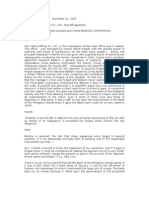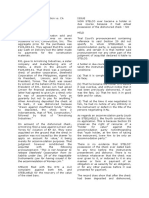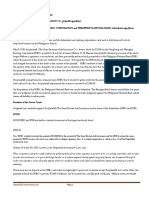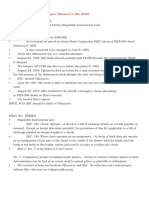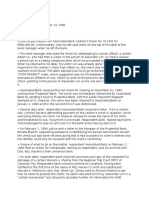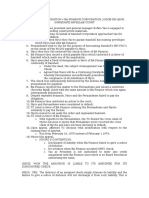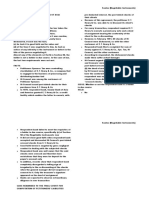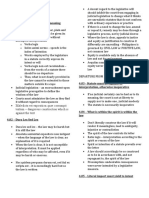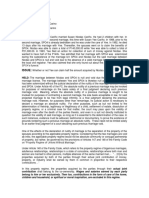Associated Bank and Conrado Cruz Vs CA, G.R. No. 89802, May 7, 1992
Associated Bank and Conrado Cruz Vs CA, G.R. No. 89802, May 7, 1992
Uploaded by
Celinka ChunCopyright:
Available Formats
Associated Bank and Conrado Cruz Vs CA, G.R. No. 89802, May 7, 1992
Associated Bank and Conrado Cruz Vs CA, G.R. No. 89802, May 7, 1992
Uploaded by
Celinka ChunOriginal Description:
Original Title
Copyright
Available Formats
Share this document
Did you find this document useful?
Is this content inappropriate?
Copyright:
Available Formats
Associated Bank and Conrado Cruz Vs CA, G.R. No. 89802, May 7, 1992
Associated Bank and Conrado Cruz Vs CA, G.R. No. 89802, May 7, 1992
Uploaded by
Celinka ChunCopyright:
Available Formats
89. Associated Bank and Conrado Cruz vs CA, G.R. No.
89802, May 7,
1992
Facts:
Respondent, Melissas RTW, is engaged in the business of readytowear garments. When she
went to her clients to collect on what she thought were still unpaid accounts, she was informed of
the issuance of crossed checks. Further inquiry revealed that the said checks had been deposited
with the Associated Bank ("the Bank") and subsequently paid by it to one Rafael Sayson, one of
its "trusted depositors," in the words of its branch manager and copetitioner, Conrado Cruz,
Sayson had not been authorized by the private respondent to deposit and encash the said
checks. Respondent sued petitioners for recovery of the total value of the checks plus damages.
Issue: Whether or not the private respondent has a cause of action against the petitioners for
their encashment and payment to another person of certain crossed checks issued in her favor
Ruling: Yes.
The six checks in the case at bar had been crossed and issued "for payee's account only." This
could only signify that the drawers had intended the same for deposit only by the person indicated
Melissa's RTW.
The petitioners were negligent when they permitted the encashment of the checks by Sayson.
The Bank should have first verified his right to endorse the crossed checks, of which he was not
the payee, and to deposit the proceeds of the checks to his own account. The Bank was by
reason of the nature of the checks put upon notice that they were issued for deposit only to the
private respondent's account. Its failure to inquire into Sayson's authority was a breach of a duty it
owed to the private respondent.
There being no evidence that the crossed checks were actually received by the private
respondent, she would have a right of action against the drawer companies, which in turn could
go against their respective drawee banks, which in turn could sue the herein petitioner as
collecting bank. In a similar situation, it was held that, to simplify proceedings, the payee of the
illegally encashed checks should be allowed to recover directly from the bank responsible for
such encashment regardless of whether or not the checks were actually delivered to the payee
You might also like
- Chapter 2 - Construction and Interpretation - AGPALO STATCONDocument4 pagesChapter 2 - Construction and Interpretation - AGPALO STATCONCelinka Chun100% (1)
- 01 Moran Vs CADocument2 pages01 Moran Vs CAArahbellsNo ratings yet
- Far East Realty Investment v. CA (G.R. No. L-36549)Document2 pagesFar East Realty Investment v. CA (G.R. No. L-36549)Rache GutierrezNo ratings yet
- Far East Realty Investment IncDocument2 pagesFar East Realty Investment IncEdward Kenneth KungNo ratings yet
- Dela Victoria v. BurgosDocument4 pagesDela Victoria v. BurgosMoireeGNo ratings yet
- Jaime v. SalvadorDocument2 pagesJaime v. SalvadorKaren Ryl Lozada BritoNo ratings yet
- Chapter Three - Agpalo StatconDocument7 pagesChapter Three - Agpalo StatconCelinka ChunNo ratings yet
- Campanilla Review Notes - July 22Document48 pagesCampanilla Review Notes - July 22Celinka Chun100% (1)
- Phil Pharmawealth V Pfizer, Inc. and Pfizer (Phil.) Inc.Document3 pagesPhil Pharmawealth V Pfizer, Inc. and Pfizer (Phil.) Inc.Celinka ChunNo ratings yet
- Integrated Realty Corporation Vs PNBDocument3 pagesIntegrated Realty Corporation Vs PNBCelinka ChunNo ratings yet
- San Carlos Milling Vs BpiDocument2 pagesSan Carlos Milling Vs Bpim_ramas2001100% (1)
- Associated Bank V CADocument2 pagesAssociated Bank V CAmmaNo ratings yet
- Case Digest NIL - Without Rigor YetDocument3 pagesCase Digest NIL - Without Rigor YetKik EtcNo ratings yet
- Digest BANK OF AMERICA NT & SA vs. PHILIPPINE RACING CLUB INCORPORATEDDocument2 pagesDigest BANK OF AMERICA NT & SA vs. PHILIPPINE RACING CLUB INCORPORATEDemolotrabNo ratings yet
- Stelco v. CADocument2 pagesStelco v. CAlittlemissbeliever100% (1)
- State Investment House, Inc., vs. Court of Appeals and Nora B. Moulic DIGESTDocument1 pageState Investment House, Inc., vs. Court of Appeals and Nora B. Moulic DIGESTMALALA MALALA100% (2)
- NEGO - 30. Far East vs. Gold Palace Jewelry, G.R. No. 168274Document2 pagesNEGO - 30. Far East vs. Gold Palace Jewelry, G.R. No. 168274annedefranco60% (5)
- Nyco Sales Corporation Vs BA Finance CorporationDocument2 pagesNyco Sales Corporation Vs BA Finance Corporationanon100% (2)
- Metrobank vs. CADocument2 pagesMetrobank vs. CAAlex RabanesNo ratings yet
- Westmont Bank V OngDocument4 pagesWestmont Bank V Ongmodernelizabennet100% (4)
- Simon v. CHR - 229 SCRA 117Document2 pagesSimon v. CHR - 229 SCRA 117Selynn CoNo ratings yet
- Loreto D. de La Victoria Vs Hon. Jose P. BurgosDocument2 pagesLoreto D. de La Victoria Vs Hon. Jose P. BurgosLenie SanchezNo ratings yet
- Digest - Bataan Cigar vs. CADocument1 pageDigest - Bataan Cigar vs. CAPaul Vincent Cunanan100% (1)
- Great Eastern Life Insurance v. Hongkong and Shanghai Bank DigestDocument2 pagesGreat Eastern Life Insurance v. Hongkong and Shanghai Bank DigestChristine Rose Bonilla LikiganNo ratings yet
- Citibank V Sps CabamonganDocument2 pagesCitibank V Sps Cabamongangel94No ratings yet
- State Investment House Vs Court of Appeals (Case Digest)Document3 pagesState Investment House Vs Court of Appeals (Case Digest)Maria Anna M Legaspi50% (2)
- Kauffman Vs PNBDocument3 pagesKauffman Vs PNBNoeh Ella de ChavezNo ratings yet
- RCBC vs. Odrada CDDocument3 pagesRCBC vs. Odrada CDMarco LucmanNo ratings yet
- Violag v. Ba FinanceDocument3 pagesViolag v. Ba FinanceRavenFoxNo ratings yet
- Juanita Salas Vs Court of Appeals (Negotiable Instruments Law)Document1 pageJuanita Salas Vs Court of Appeals (Negotiable Instruments Law)Lance ClementeNo ratings yet
- Areza v. Express Savings BankDocument3 pagesAreza v. Express Savings Bankelaine bercenioNo ratings yet
- Travel-On v. CA / PP v. ManiegoDocument2 pagesTravel-On v. CA / PP v. ManiegolchieSNo ratings yet
- Atrium v. CA (Digest)Document2 pagesAtrium v. CA (Digest)larcia025No ratings yet
- 52 Sadaya Vs SevillaDocument4 pages52 Sadaya Vs SevillaCharm Divina LascotaNo ratings yet
- South City Homes Vs Ba FinanceDocument5 pagesSouth City Homes Vs Ba Financeangelsu04No ratings yet
- Nego-International Bank v. GuecoDocument3 pagesNego-International Bank v. GuecoIrish GarciaNo ratings yet
- De Ocampo DigestDocument2 pagesDe Ocampo Digestjim jim100% (1)
- Far East Realty v. CADocument2 pagesFar East Realty v. CAKeisha Mariah Catabay Lauigan100% (1)
- Spouses Moran v. CA - LubagDocument2 pagesSpouses Moran v. CA - LubagHurjae Soriano LubagNo ratings yet
- B. Digest Tapuz Vs Del RosarioDocument3 pagesB. Digest Tapuz Vs Del RosarioWhoopi Jane MagdozaNo ratings yet
- DIGEST - Mate v. CA PDFDocument2 pagesDIGEST - Mate v. CA PDFLuis MacababbadNo ratings yet
- Ang vs. Associated BankDocument3 pagesAng vs. Associated Bankmichi barrancoNo ratings yet
- Negotiable Instruments Case Digest: Villanueva V. Nite (2006) G.R. No. 148211Document1 pageNegotiable Instruments Case Digest: Villanueva V. Nite (2006) G.R. No. 148211Ian AuroNo ratings yet
- Vds de Nava v. Ynchausti SteamshipDocument2 pagesVds de Nava v. Ynchausti SteamshipGieldan BulalacaoNo ratings yet
- Patrimonio v. GutierrezDocument2 pagesPatrimonio v. GutierrezNikkiZai100% (1)
- Mesina vs. IACDocument1 pageMesina vs. IACMae NavarraNo ratings yet
- 72 - de La Victoria v. BurgosDocument1 page72 - de La Victoria v. BurgoseieipayadNo ratings yet
- 3 Digest-GSIS-v.-CA-G.R.-No.-101632-January-13-1997Document1 page3 Digest-GSIS-v.-CA-G.R.-No.-101632-January-13-1997sophiaNo ratings yet
- Nego Case Digests - ForgeryDocument10 pagesNego Case Digests - ForgeryCates TorresNo ratings yet
- Cesar v. Areza and Lolita B. Areza Vs - Express Savings Bank, Inc. and Michael PotencianoDocument4 pagesCesar v. Areza and Lolita B. Areza Vs - Express Savings Bank, Inc. and Michael PotencianoSam SaripNo ratings yet
- Samsung Construction Co. Phils, Inc. vs. FEBTC, Et. Al. G.R. No. 129015Document2 pagesSamsung Construction Co. Phils, Inc. vs. FEBTC, Et. Al. G.R. No. 129015Jay EmNo ratings yet
- SPCL Case DigestsDocument191 pagesSPCL Case DigestsPaul Angelo TombocNo ratings yet
- 1 MESINA Vs IACDocument3 pages1 MESINA Vs IACAlexandra Nicole Manigos BaringNo ratings yet
- NIL Case DigestsDocument3 pagesNIL Case DigestsOtep Belciña Lumabas100% (1)
- Bataan Cigar & Cigarette CompanyBataan Cigar and Cigarette Factory, Inc. vs. Court of Appeals 230 SCRA 643Document2 pagesBataan Cigar & Cigarette CompanyBataan Cigar and Cigarette Factory, Inc. vs. Court of Appeals 230 SCRA 643Pixie DustNo ratings yet
- NYCO SALES CORPORATION V BA FINANCE CORPORATIONDocument2 pagesNYCO SALES CORPORATION V BA FINANCE CORPORATIONColee StiflerNo ratings yet
- Manuel Lim V CADocument2 pagesManuel Lim V CAONCEaSONE4LYF100% (1)
- 24.) BPI v. CADocument2 pages24.) BPI v. CAAnna Ray Eleanor De Guia100% (1)
- Crisologo Vs CADocument2 pagesCrisologo Vs CAThoughts and More ThoughtsNo ratings yet
- Yang V CADocument2 pagesYang V CAAnonymous bOncqbp8yiNo ratings yet
- N-60-01 Araneta V PerezDocument1 pageN-60-01 Araneta V PerezAndrew GallardoNo ratings yet
- Tibajia, Jr.v. CA, GR 100290, June 4, 1993 (Reviewed)Document2 pagesTibajia, Jr.v. CA, GR 100290, June 4, 1993 (Reviewed)Steve UyNo ratings yet
- M. Samsung Construction Vs Far East BankDocument2 pagesM. Samsung Construction Vs Far East BankPaulitoPunongbayanNo ratings yet
- Hi-Cement v. Insular BankDocument2 pagesHi-Cement v. Insular BankRenzoSantos100% (1)
- Associated Bank v. Court of Appeals G.R. No. 89802 07 May 1992 Case DigestDocument3 pagesAssociated Bank v. Court of Appeals G.R. No. 89802 07 May 1992 Case DigestPhi SalvadorNo ratings yet
- Gracilla V CIRDocument1 pageGracilla V CIRCelinka ChunNo ratings yet
- Chapter Four - Agpalo StatconDocument7 pagesChapter Four - Agpalo StatconCelinka Chun100% (1)
- Chapter Five - Agpalo StatconDocument10 pagesChapter Five - Agpalo StatconCelinka ChunNo ratings yet
- PPL V Alegre, Domantay, PrincipeDocument12 pagesPPL V Alegre, Domantay, PrincipeCelinka ChunNo ratings yet
- CO V Deportation BoardDocument2 pagesCO V Deportation BoardCelinka ChunNo ratings yet
- China Bank V CA, 270 SCRA: Pledge CasesDocument5 pagesChina Bank V CA, 270 SCRA: Pledge CasesCelinka ChunNo ratings yet
- Case DigestDocument4 pagesCase DigestCelinka ChunNo ratings yet
- Chapter One Summary of Agpalo StatconDocument12 pagesChapter One Summary of Agpalo StatconCelinka Chun100% (1)
- Carino V CarinoDocument2 pagesCarino V CarinoCelinka ChunNo ratings yet
- Rodriguez Vs BorjaDocument2 pagesRodriguez Vs BorjaCelinka ChunNo ratings yet
- Tuason V CaDocument1 pageTuason V CaCelinka ChunNo ratings yet
- Limine, 'On The Institution of Proceedings Against Him.' He Must, Moreover, Point Out To TheDocument2 pagesLimine, 'On The Institution of Proceedings Against Him.' He Must, Moreover, Point Out To TheCelinka ChunNo ratings yet
- Good Earth Emporium IncDocument4 pagesGood Earth Emporium IncCelinka ChunNo ratings yet
- Cir VS BpiDocument2 pagesCir VS BpiCelinka ChunNo ratings yet
- Gomez Vs PalomarDocument2 pagesGomez Vs PalomarCelinka Chun100% (2)
- Secretary of The Department of Transportation and Communications (DOTC) V Roberto MabalotDocument1 pageSecretary of The Department of Transportation and Communications (DOTC) V Roberto MabalotCelinka ChunNo ratings yet
- Compiled BarQs Insurance LawDocument54 pagesCompiled BarQs Insurance LawCelinka Chun100% (2)
- Aurelio Vs CADocument1 pageAurelio Vs CACelinka ChunNo ratings yet
- Gaotian Vs GaffudDocument4 pagesGaotian Vs GaffudCelinka ChunNo ratings yet
- Province of Batangas Vs RomuloDocument2 pagesProvince of Batangas Vs RomuloCelinka Chun100% (4)
- Lutz Vs Araneta, G.R. No. L-7859, December 22, 1955Document1 pageLutz Vs Araneta, G.R. No. L-7859, December 22, 1955Celinka Chun100% (3)
- Sanchez V BuenaviajieDocument1 pageSanchez V BuenaviajieCelinka ChunNo ratings yet
- Malinao Vs Reyes 255 SCRA 616Document1 pageMalinao Vs Reyes 255 SCRA 616Celinka ChunNo ratings yet
- Villacorta Vs BernardoDocument1 pageVillacorta Vs BernardoCelinka ChunNo ratings yet
- Brent Vs ZamoraDocument2 pagesBrent Vs ZamoraCelinka ChunNo ratings yet










